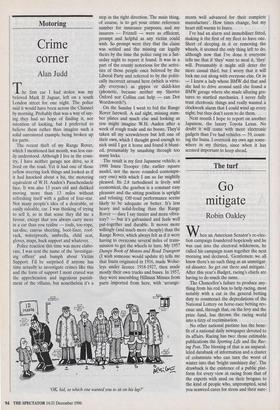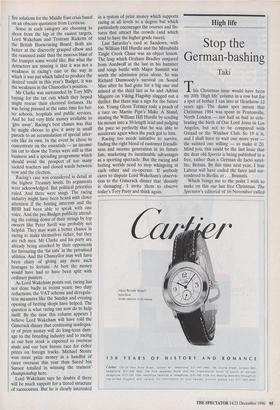The turf
Go mitigate
Robin Oakley
When an American Senator's re-elec- tion campaign foundered hopelessly and he was cast into the electoral wilderness, he called his campaign team together the next morning and declared, 'Gentlemen: we all know there's no such thing as an unmitigat- ed disaster. So get out there and mitigate.' After this year's Budget, racing's chiefs are having to do much the same.
The Chancellor's failure to produce any- thing from his red box to help racing, most notably with a cut in the general betting duty to counteract the depredations of the National Lottery on horse-race betting rev- enue and, through that, on the levy and the prize fund, has thrown the racing world into a tizzy of recrimination.
No other national pastime has the bene- fit of a national daily newspaper devoted to its affairs. Racing has two: those estimable publications the Spotting Life and the Rac- ing Post. The blessing of that is an unparal- leled databank of information and a cluster of columnists who can turn the worst of winter into that 'bright sunshiney day'. The drawback is the existence of a public plat- form for every view in racing from that of the experts with mud on their brogues to the kind of people who, unprompted, send you seaweed cures for stress and their sure- fire solutions for the Middle East crisis based on an obscure quotation from Leviticus. Some in each category are choosing to shoot from the hip at the easiest targets, Lord Wakeham and Tristram Ricketts of the British Horseracing Board. Both are better at the discreetly grasped elbow and the reasoned aside than the raucous blast of the trumpet some would like. But what the detractors are missing is that it was not a weakness in racing's case or the way in which it was put which failed to produce the desired result in this year's Budget, it was the weakness in the Chancellor's position.
Mr Clarke was surrounded by Tory MPs baying for the tax cuts which they hoped might rescue their electoral fortunes. He was being pressed at the same time for bet- ter schools, hospitals and public services. And he had very little money available to 'give away'. Racing's best chance was that he might choose to give it away in small parcels to an accumulation of special inter- ests like its own. In the event he chose to concentrate on the essentials — an income tax cut to show the Tories were still in that business and a spending programme which should avoid the prospect of too many sacked teachers and closed wards between now and the election.
Racing's case was considered in detail at the highest Treasury levels. Its arguments were acknowledged. But political priorities ruled. And there were snags. The racing industry might have been heard with closer attention if the betting interests and the BHB had been able to speak with one voice. And the pre-Budget publicity attend- ing the cutting down of their strings by top owners like Peter Savill was probably not helpful. They may want a better chance in racing to make themselves richer, but they are rich men. Mr Clarke and his party are already being attacked by their opponents for favouring the 'fat cats' in the privatised utilities. And the Chancellor may well have been chary of giving any more such hostages to fortune. At best the money would have had to have been split with ordinary punters. As Lord Wakeham points out, racing has not done badly in recent years: two duty reductions, the VAT scheme and deregula- tion measures like the Sunday and evening opening of betting shops have helped. The question is what racing can now do to help itself. By the time this column appears I believe Lord Wakeham will have told the Gimcrack dinner that continuing inadequa- cy of prize money will do long-term dam- age to the breeding industry and to racing as our best stock is exported to overseas studs and our best horses race for richer prizes on foreign tracks. Michael Stoute won more prize money in a handful of races overseas this year than Saeed bin Suroor totalled in winning the trainers' championship here. Lord Wakeham says he doubts if there will be much support for a tiered structure of racecourses. But he is clearly interested in a system of prize money which supports racing at all levels to a degree but which particularly encourages the courses and fix- tures that attract the crowds (and which tend to have the higher grade races).
Last Saturday's card at Sandown, with the William Hill Hurdle and the Mitsubishi Tingle Creek Chase was an object lesson. The leap which Graham Bradley conjured from Aardwolf at the last in his hammer and tongs battle with Major Summit was worth the admission price alone. So was Richard Dunwoody's survival on Sound Man after he had gone for a big one and missed at the third last as he and Adrian Maguire on Viking Flagship slugged out a thriller. But there was a sign for the future too. Young Glenn Tormey rode a peach of a race on Martin Pipe's Make A Stand, stealing the William Hill Hurdle by sending his mount into a 30-length lead and judging the pace so perfectly that he was able to accelerate again when the pack got to him.
Racing too needs initiative to survive, finding the right blend of customer friendli- ness and income generation in its fixture lists, marketing its inestimable advantages as a sporting spectacle. But the racing and betting worlds need to stop whingeing at each other and co-operate. If anybody cares to dispute Lord Wakeham's observa- tion to the Gimcrack dinner that 'disunity is damaging', I invite them to observe today's Tory Party and think again.



















































































































 Previous page
Previous page